- Home
- Lewis Carroll
Through the Looking-Glass and What Alice Found There
Through the Looking-Glass and What Alice Found There Read online
‘Oh, Kitty! how nice it would be if we could only get through into Looking-glass House! I’m sure it’s got, oh! such beautiful things in it! Let’s pretend there’s a way of getting through into it, somehow, Kitty. Let’s pretend the glass has got all soft like gauze, so that we can get through. Why, it’s turning into a sort of mist now, I declare! It’ll be easy enough to get through –’ She was up on the chimney-piece while she said this, though she hardly knew how she had got there. And certainly the glass was beginning to melt away, just like a bright silvery mist.
In another moment Alice was through the glass, and had jumped lightly down into the Looking-glass room.
LEWIS CARROLL
Through the
Looking-Glass
INTRODUCED BY
CHRIS RIDDELL
Illustrations by JOHN TENNIEL
PUFFIN
PUFFIN BOOKS
Published by the Penguin Group
Penguin Books Ltd, 80 Strand, London WC2R 0RL, England
Penguin Group (USA) Inc., 375 Hudson Street, New York, New York 10014, USA
Penguin Group (Canada), 90 Eglinton Avenue East, Suite 700, Toronto, Ontario, Canada M4P 2Y3
(a division of Pearson Penguin Canada Inc.)
Penguin Ireland, 25 St Stephen’s Green, Dublin 2, Ireland (a division of Penguin Books Ltd)
Penguin Group (Australia), 250 Camberwell Road, Camberwell, Victoria 3124, Australia
(a division of Pearson Australia Group Pty Ltd)
Penguin Books India Pvt Ltd, 11 Community Centre, Panchsheel Park, New Delhi – 110 017, India
Penguin Group (NZ), 67 Apollo Drive, Rosedale, North Shore 0632, New Zealand
(a division of Pearson New Zealand Ltd)
Penguin Books (South Africa) (Pty) Ltd, 24 Sturdee Avenue, Rosebank, Johannesburg 2196, South Africa
Penguin Books Ltd, Registered Offices: 80 Strand, London WC2R 0RL, England
puffinbooks.com
First published 1871
Published in Puffin Books 1948
Published with Alice’s Adventures in Wonderland in one volume 1962
Published in Puffin Classics 1984
Reissued in this edition 2010
Introduction copyright © Chris Riddell, 2010
Endnotes copyright © Penguin Books, 2010
All rights reserved
Except in the United States of America, this book is sold subject to the condition that it shall not, by way of trade or otherwise, be lent, re-sold, hired out, or otherwise circulated without the publisher’s prior consent in any form of binding or cover other than that in which it is published and without a similar condition including this condition being imposed on the subsequent purchaser
ISBN: 978-0-14-194670-2
INTRODUCTION BY
CHRIS RIDDELL
‘Which Alice book do you prefer?’ a writer once asked me. ‘Wonderland or Through the Looking-Glass?’ He maintained that all readers could be divided into two types: those who loved the playing-card world of Wonderland and those who preferred the chessboard landscape of Through the Looking-Glass.
It is a difficult choice. Both books are full of Carroll’s fantastic characters, beautifully illustrated by Sir John Tenniel. I’ve always loved Alice’s Adventures in Wonderland – the white rabbit with his immaculate waistcoat and fobwatch, the Madhatter’s tea party and the Mock Turtle’s songs. Through the Looking-Glass, on the other hand, has Tweedledum and Tweedledee, Humpty Dumpty and the wonderful White Knight.
Like Tenniel, Lewis Carroll’s superb illustrator, I am a political cartoonist and I have often borrowed the great man’s creations, ‘with apologies to Tenniel’, in my cartoons. I’ve drawn government ministers as Tweedledum and Tweedledee, several prime ministers as Humpty Dumpty falling off high walls and, once, an iron lady on the White Knight’s horse.
In many ways Through the Looking-Glass is a mirror image of Alice’s Adventures in Wonderland. The first book begins outdoors, beside a river on a warm summer’s day, while Through the Looking-Glass begins indoors, in a sitting room on a cold winter’s night six months later. In Wonderland Alice grows and shrinks in size, while in the Looking-Glass world time moves backwards and Alice has to run at full pelt to stay in one place. As the Red Queen tells her, ‘Now, here, you see, it takes all the running you can do, to keep in the same place. If you want to get somewhere else, you need to run at least twice as fast as that!’ Later the White Queen explains that the advantage of living backwards is that the memory works both ways and that she can remember things that happened the week after next, for instance: ‘There’s the King’s Messenger. He’s in prison now, being punished; and the trial doesn’t even begin till next Wednesday; and of course the crime comes last of all.’ The King’s messenger is a familiar face from Wonderland.
Both worlds are absurd and funny, but it is the poems that make Through the Looking-Glass so special for me. This book includes two of the greatest nonsense poems ever written. In ‘The Walrus and the Carpenter’ two absurd characters wander along the seashore with smartly dressed oysters tripping along behind them:
Their coats were brushed, their faces washed,
Their shoes were clean and neat –
And this was odd, because, you know,
They hadn’t any feet.
The Walrus charms the oysters with my favourite lines in the poem:
‘The time has come,’ the Walrus said,
‘To talk of many things:
Of shoes – and ships – and sealing-wax –
Of cabbages – and kings –
And why the sea is boiling hot –
And whether pigs have wings.’
I’ve drawn my fair share of winged pigs as a cartoonist.
But what makes Through the Looking-Glass a classic is the short poem in mirror-writing in the very first chapter. Alice holds it up to the looking-glass in order to read ‘Jabberwocky’. The nonsense words it contains have made their way into the English language – ‘chortled’, ‘burbled’, ‘whiffling’ and, of course, ‘galumphing’. Other words light up the imagination like fireworks:
’Twas brillig, and the slithy toves,
Did gyre and gamble in the wabe;
All mimsy were the borogoves,
And the mome raths outgrabe.
If you want to know what that means, try Humpty Dumpty’s explanations in chapter six.
So, in answer to that writer’s question, I think I’d have to choose the back-to-front chessboard world of Through the Looking-Glass where, brillig or not, I’d happily gyre and gimble in the wabe until those mome raths finally outgrabe.
Contents
Preface
1 Looking-Glass House
2 The Garden of Live Flowers
3 Looking-Glass Insects
4 Tweedledum and Tweedledee
5 Wool and Water
6 Humpty Dumpty
7 The Lion and the Unicorn
8 ‘It’s My Own Invention’
9 Queen Alice
10 Shaking
11 Waking
12 Which Dreamed It?
DRAMATIS PERSONÆ
(As arranged before commencement of game)
WHITE RED
PIECES PAWNS PIECES PAWNS
Tweedledee Daisy Daisy Humpty Dumpty
Unicorn Haigha Messenger Carpenter
Sheep Oyster Oyster Walrus
W. Queen ‘Lily’ Tiger-lily R. Queen
W. King Fawn Rose R. King
Aged man Oyster Frog Crow
W. Knight Hatta Oyster R. Knight
Tweedledum Daisy Daisy Lion
RED<
br />
WHITE
White Pawn (Alice) to play, and win in eleven moves
PAGE PAGE
1. Alice meets R.Q. 25 1. R.Q. to K.R.’s 4th 32
2. Alice through Q.’s 3d (by railway) 34 2. W.Q. to Q.B.’s 4th (after shawl) 65
to Q.’s 4th (Tweedledum and Tweedledee) 47
3. Alice meets W.Q. (with shawl) 65 3. W.Q. to Q.B.’s 5th (becomes sheep) 72
4. Alice to Q.’s 5th (shop, river, shop) 72 4. W.Q. to K.B.’s 8th (leaves egg on shelf) 80
5. Alice to Q.’s 6th (Humpty Dumpty) 81 5. W.Q. to Q.B.’s 8th (flying from R.Kt.) 106
6. Alice to Q.’s 7th (forest) 111 6. R.Kt. to K.’s 2nd (ch.) 113
7. W.Kt. takes R.Kt. 116 7. W.Kt. to K.B.’s 5th 131
8. Alice to Q.’s 8th (coronation) 132 8. R.Q. to K.’s sq. (examination) 135
9. Alice becomes Queen 141 9. Queens castle 143
10. Alice castles (feast) 147 10. W.Q. to Q.R.’s 6th (soup) 152
11. Alice takes R.Q. & wins 155
FROM THE AUTHOR’S PREFACE TO THE SIXTY-FIRST THOUSAND OF THE 6/- EDITION, 1897
As the chess-problem, given on a previous page, has puzzled some of my readers, it may be well to explain that it is correctly worked out, so far as the moves are concerned. The alternation of Red and White is perhaps not so strictly observed as it might be, and the ‘castling’ of the three Queens is merely a way of saying that they entered the palace: but the ‘check’ of the White King at move 6, the capture of the Red Knight at move 7, and the final ‘checkmate’ of the Red King, will be found, by any one who will take the trouble to set the pieces and play the moves as directed, to be strictly in accordance with the laws of the game.
The new words, in the poem Jabberwocky (see pp. 15–18), have given rise to some differences of opinion as to their pronunciation: so it may be well to give instructions on that point also. Pronounce ‘slithy’ as if it were the two words ‘sly, the’: make the ‘g’ hard in ‘gyre’ and ‘gimble’: and pronounce ‘rath’ to rhyme with ‘bath.’
Christmas, 1896
Child of the pure unclouded brow
And dreaming eyes of wonder!
Though time be fleet, and I and thou
Are half a life asunder,
Thy loving smile will surely hail
The love-gift of a fairy-tale.
I have not seen thy sunny face,
Nor heard thy silver laughter:
No thought of me shall find a place
In thy young life’s hereafter –
Enough that now thou wilt not fail
To listen to my fairy-tale.
A tale begun in other days,
When summer suns were glowing –
A simple chime, that served to time
The rhythm of our rowing –
Whose echoes live in memory yet,
Though envious years would say ‘forget.’
Come, hearken then, ere voice of dread,
With bitter tidings laden,
Shall summon to unwelcome bed
A melancholy maiden!
We are but older children, dear,
Who fret to find our bedtime near.
Without, the frost, the blinding snow,
The storm-wind’s moody madness –
Within, the firelight’s ruddy glow,
And childhood’s nest of gladness.
The magic words shall hold thee fast:
Thou shalt not heed the raving blast.
And though the shadow of a sigh
May tremble through the story,
For ‘happy summer days’ gone by,
And vanish’d summer glory –
It shall not touch with breath of bale
The pleasance of our fairy-tale.
1
Looking-Glass House
One thing was certain, that the white kitten had had nothing to do with it: – it was the black kitten’s fault entirely. For the white kitten had been having its face washed by the old cat for the last quarter of an hour (and bearing it pretty well, considering); so you see that it couldn’t have had any hand in the mischief.
The way Dinah washed her children’s faces was this: first she held the poor thing down by its ear with one paw, and then with the other paw she rubbed its face all over, the wrong way, beginning at the nose: and just now, as I said, she was hard at work on the white kitten, which was lying quite still and trying to purr – no doubt feeling that it was all meant for its good.
But the black kitten had been finished with earlier in the afternoon, and so, while Alice was sitting curled up in a corner of the great arm-chair, half talking to herself and half asleep, the kitten had been having a grand game of romps with the ball of worsted Alice had been trying to wind up, and had been rolling it up and down till it had all come undone again; and there it was, spread over the hearth-rug, all knots and tangles with the kitten running after its own tail in the middle.
‘Oh, you wicked wicked little thing!’ cried Alice, catching up the kitten, and giving it a little kiss to make it understand that it was in disgrace. ‘Really, Dinah ought to have taught you better manners! You ought, Dinah, you know you ought!’ she added, looking reproachfully at the old cat, and speaking in as cross a voice as she could manage – and then she scrambled back into the arm-chair, taking the kitten and the worsted with her, and began winding up the ball again. But she didn’t get on very fast, as she was talking all the time, sometimes to the kitten, and sometimes to herself. Kitty sat very demurely on her knee, pretending to watch the progress of the winding, and now and then putting out one paw and gently touching the ball, as if it would be glad to help if it might.
‘Do you know what to-morrow is, Kitty?’ Alice began. ‘You’d have guessed if you’d been up in the window with me – only Dinah was making you tidy, so you couldn’t. I was watching the boys getting in sticks for the bonfire – and it wants plenty of sticks, Kitty! Only it got so cold, and it snowed so, they had to leave off. Never mind, Kitty, we’ll go and see the bonfire to-morrow.’ Here Alice wound two or three turns of the worsted round the kitten’s neck, just to see how it would look: this led to a scramble, in which the ball rolled down upon the floor, and yards and yards of it got unwound again.
‘Do you know, I was so angry, Kitty,’ Alice went on as soon as they were comfortably settled again, ‘when I saw all the mischief you had been doing, I was very nearly opening the window, and putting you out into the snow! And you’d have deserved it, you little mischievous darling! What have you got to say for yourself? Now don’t interrupt me!’ she went on, holding up one finger. ‘I’m going to tell you all your faults. Number one: you squeaked twice while Dinah was washing your face this morning. Now you can’t deny it, Kitty: I heard you! What’s that you say?’ (pretending that the kitten was speaking). ‘Her paw went into your eye? Well, that’s your fault, for keeping your eyes open – if you’d shut them tight up, it wouldn’t have happened. Now don’t make any more excuses, but listen! Number two: you pulled Snowdrop away by the tail just as I had put down the saucer of milk before her! What, you were thirsty, were you? How do you know she wasn’t thirsty too? Now for number three: you unwound every bit of the worsted while I wasn’t looking!
‘That’s three faults, Kitty, and you’ve not been punished for any of them yet. You know I’m saving up all your punishments for Wednesday week – Suppose they had saved up all my punishments!’ she went on, talking more to herself than the kitten. ‘What would they do at the end of a year? I should be sent to prison, I suppose, when the day came. Or – let me see – suppose each punishment was to be going without a dinner: then, when the miserable day came, I should have to go without fifty dinners at once! Well, I shouldn’t mind that much! I’d far rather go without them than eat them!
‘Do you hear the snow against the window-panes, Kitty? How nice and soft it sounds! Just as if some one was kissing the window all over outside. I wonder if the snow loves the trees and fields, that it kisses them so gentl
y? And then it covers them up snug, you know, with a white quilt; and perhaps it says, “Go to sleep, darlings, till the summer comes again.” And when they wake up in the summer, Kitty, they dress themselves all in green, and dance about – whenever the wind blows – oh, that’s very pretty!’ cried Alice, dropping the ball of worsted to clap her hands. ‘And I do so wish it was true! I’m sure the woods look sleepy in the autumn, when the leaves are getting brown.
‘Kitty, can you play chess? Now, don’t smile, my dear, I’m asking it seriously. Because, when we were playing just now, you watched just as if you understood it: and when I said “Check!” you purred! Well, it was a nice check, Kitty, and really I might have won, if it hadn’t been for that nasty Knight, that came wriggling down among my pieces. Kitty, dear, let’s pretend –’ And here I wish I could tell you half the things Alice used to say, beginning with her favourite phrase ‘Let’s pretend.’ She had had quite a long argument with her sister only the day before – all because Alice had begun with ‘Let’s pretend we’re kings and queens;’ and her sister, who liked being very exact, had argued that they couldn’t, because there were only two of them, and Alice had been reduced at last to say, ‘Well, you can be one of them, then, and I’ll be all the rest.’ And once she had really frightened her old nurse by shouting suddenly in her ear, ‘Nurse! Do let’s pretend that I’m a hungry hyæna, and you’re a bone!’
But this is taking us away from Alice’s speech to the kitten. ‘Let’s pretend that you’re the Red Queen, Kitty! Do you know, I think if you sat up and folded your arms, you’d look exactly like her. Now do try, there’s a dear!’ And Alice got the Red Queen off the table, and set it up before the kitten as a model for it to imitate: however, the thing didn’t succeed, principally, Alice said, because the kitten wouldn’t fold its arms properly. So, to punish it, she held it up to the Looking-glass, that it might see how sulky it was – ‘and if you’re not good directly,’ she added, ‘I’ll put you through into Looking-glass House. How would you like that?

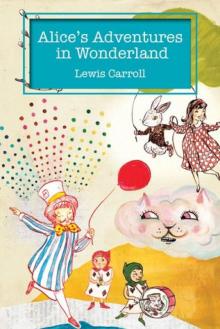 Alice's Adventures in Wonderland & Through the Looking-Glass
Alice's Adventures in Wonderland & Through the Looking-Glass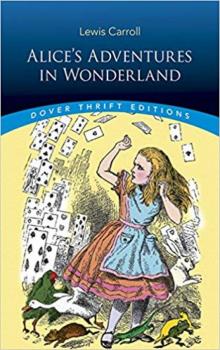 Alice's Adventures in Wonderland
Alice's Adventures in Wonderland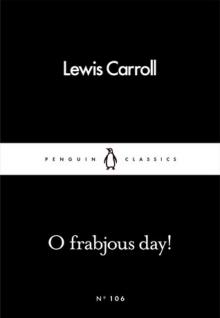 O Frabjous Day!
O Frabjous Day!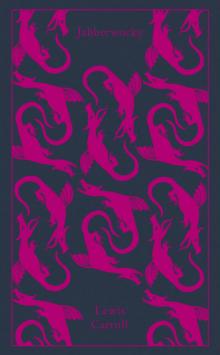 Jabberwocky and Other Nonsense
Jabberwocky and Other Nonsense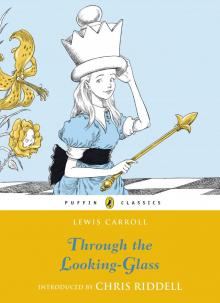 Through the Looking-Glass and What Alice Found There
Through the Looking-Glass and What Alice Found There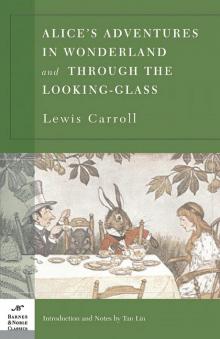 Alice's Adventures in Wonderland and Through the Looking Glass (B&N)
Alice's Adventures in Wonderland and Through the Looking Glass (B&N)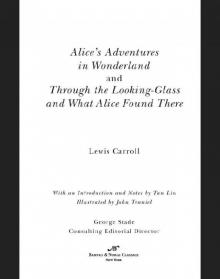 Alice's Adventures in Wonderland and Through the Looking Glass (Barnes & Noble Cla
Alice's Adventures in Wonderland and Through the Looking Glass (Barnes & Noble Cla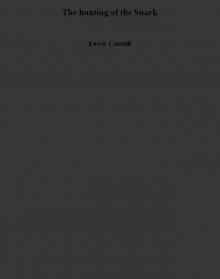 The hunting of the Snark
The hunting of the Snark The Complete Alice in Wonderland (Wonderland Imprints Master Editions)
The Complete Alice in Wonderland (Wonderland Imprints Master Editions)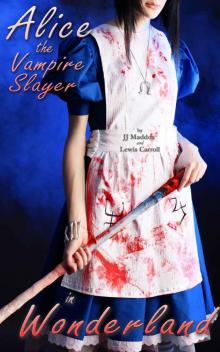 Alice in Wonderland: The Vampire Slayer
Alice in Wonderland: The Vampire Slayer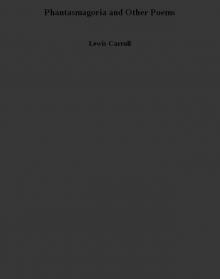 Phantasmagoria and Other Poems
Phantasmagoria and Other Poems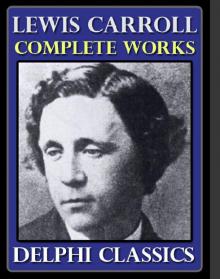 Complete Works of Lewis Carroll
Complete Works of Lewis Carroll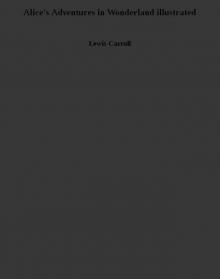 Alice's Adventures in Wonderland illustrated
Alice's Adventures in Wonderland illustrated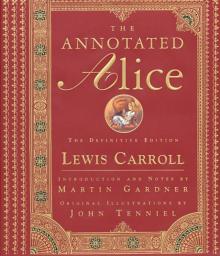 The Annotated Alice: The Definitive Edition (The Annotated Books)
The Annotated Alice: The Definitive Edition (The Annotated Books) Through the Looking Glass
Through the Looking Glass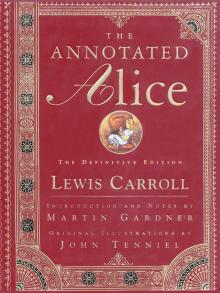 The Annotated Alice
The Annotated Alice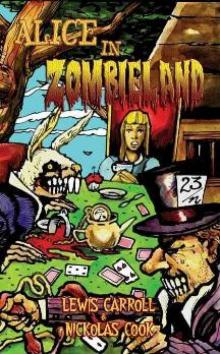 Alice in Zombieland
Alice in Zombieland